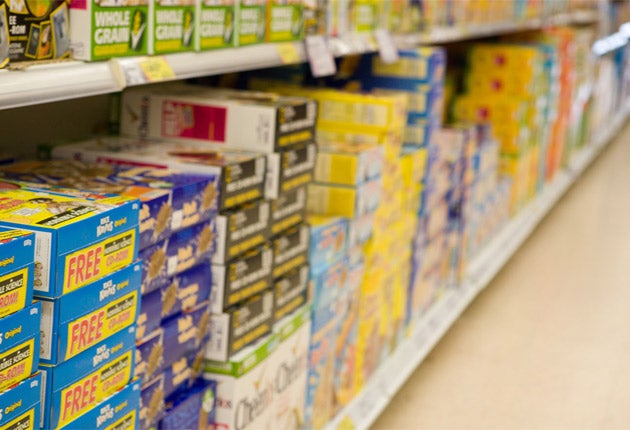Health fears over recycled food packaging

Your support helps us to tell the story
From reproductive rights to climate change to Big Tech, The Independent is on the ground when the story is developing. Whether it's investigating the financials of Elon Musk's pro-Trump PAC or producing our latest documentary, 'The A Word', which shines a light on the American women fighting for reproductive rights, we know how important it is to parse out the facts from the messaging.
At such a critical moment in US history, we need reporters on the ground. Your donation allows us to keep sending journalists to speak to both sides of the story.
The Independent is trusted by Americans across the entire political spectrum. And unlike many other quality news outlets, we choose not to lock Americans out of our reporting and analysis with paywalls. We believe quality journalism should be available to everyone, paid for by those who can afford it.
Your support makes all the difference.The cereal packet on your breakfast table could be a health hazard, according to scientists. Swiss researchers have found that when old paper is used to make recycled cardboard, mineral oils in the printing ink may contaminate food stuffs packed inside it.
More than half the cardboard in Europe is recycled and mineral oils have been found in the packaged foods at up to 100 times permitted levels.In one scientific paper, researchers described the potential for the oils to migrate into foodstuffs as "frightening".
The oils leak out of the cardboard in the form of a gas and even the presence of a plastic inner bag is not enough to prevent contamination.
Jordans, the upmarket cereal producer, announced yesterday that it had phased out recycled cardboard from its cereal products last year and replaced it with virgin cardboard made from trees.
It said in a statement that, as an environmentally responsible company, it had to "balance food safety issues alongside our environmental values". Other cereal manfacturers said they were reviewing the situation but would not be making immediate changes.
Derek Croucher, of Morning Foods, said: "We're confident of the packaging we're using and in our view there is no risk to health, and the environmental effects of changing would be massive. There simply aren't enough trees in Europe for everyone to move to virgin board as a knee-jerk reaction to this."
According to Swiss scientists, who carried out the studies for authorities in Germany, exposure to mineral oils has been linked to inflammation of internal organs and cancer. Foods with the greatest surface area to volume – such as flour, rice, pasta and breakfast cereals – are most vulnerable to contamination. However, they stressed that consumers would have to be exposed to the affected foods for many years to be in any danger.
The UK Food Standards Agency said the research was "interesting" but that there was no "firm evidence" of food safety risks. It said it was "gathering information on the extent of the presence of mineral oils in food packaging on the UK market".
"The agency is also specifically looking at recycled material to ensure that manufacturing processes successfully remove substances that could present a food safety concern from the finished packaging," it said in a statement.
The alternative to recycled cardboard is "virgin board," made from trees. But this is more expensive and there is not enough to meet demand, should the recycled kind be phased out.
The research was led by Dr Koni Grob at the government-run food safety laboratory in Zurich. In one study last year he tested 119 products bought from German supermarkets for the German food ministry. The results showed mineral oils passed easily through the inner bags used to keep food fresh and the longer a product stood on the shelves the more mineral oil it was likely to absorb.
The Food and Drink federation, representing manufacturers, said it had "revised guidance for food manufacturers on recycled carton board in food packaging." A spokeswoman said the revised guidance was to alert manufacturers to the issue "so they can decide what to do about it on a case by case basis".
Join our commenting forum
Join thought-provoking conversations, follow other Independent readers and see their replies
Comments